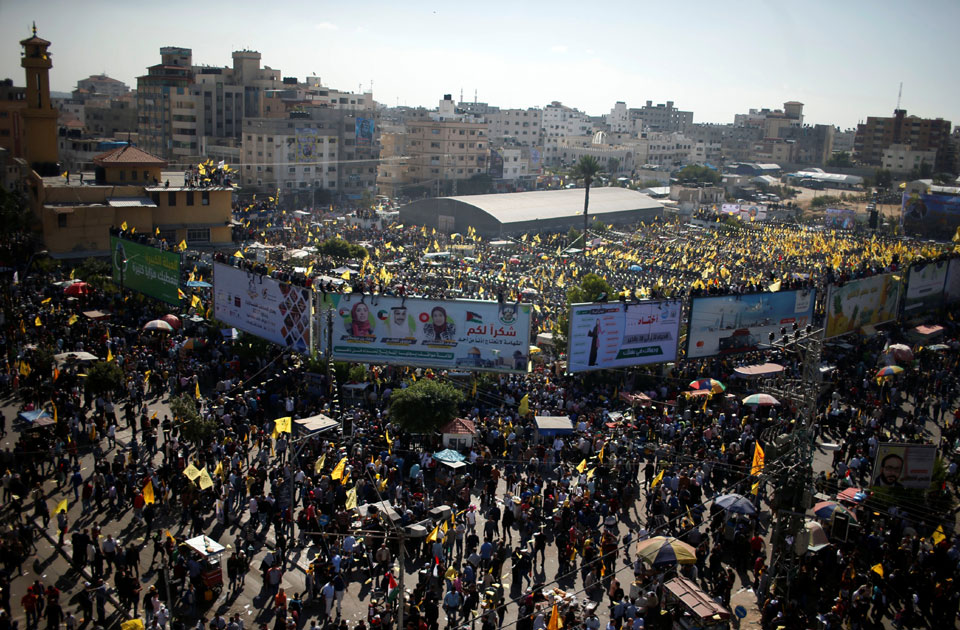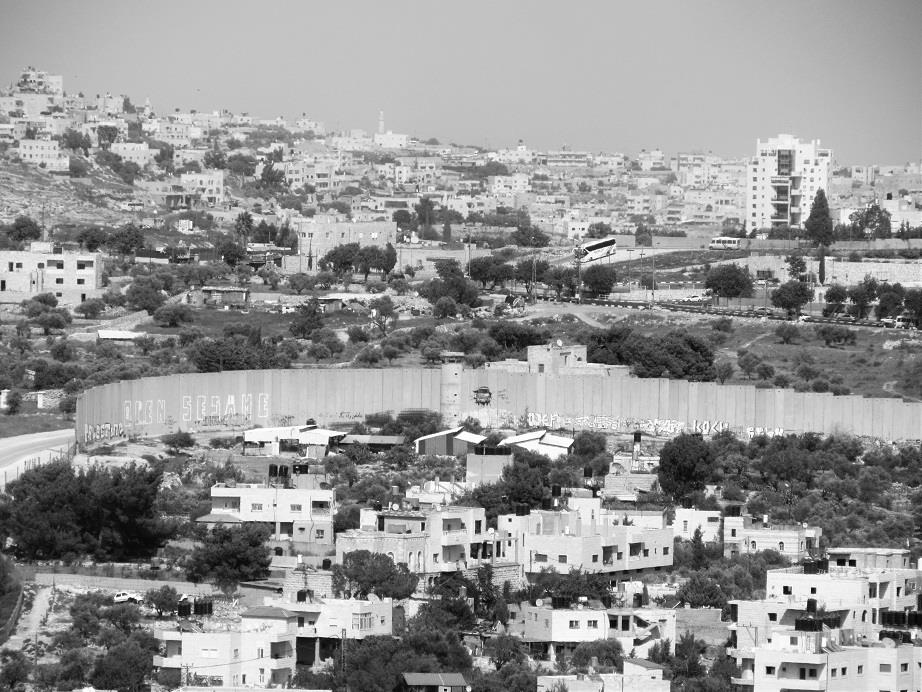Mario Fernández Silva: “A wall is the acceptance of a failed policy”
- Analysis and thoughts by historian Mario Fernández Silva (1949-2015) on the Israeli-Palestinian conflict in 2004, in the context of the US-led “War on Terror”.

I did an interview between June and July 2004 to the Costa Rican diplomat Mario Fernández Silva. He was former Deputy Minister of Foreign Affairs, Head of Mission to the European Union and specialist in the Middle East.
For more than 50 years, the Arab-Israeli crisis has shocked the Middle East. The U.S.-led war on terrorism with its aggressions against Afghanistan and Iraq, following the attack of September 11, 2001, deepened the destabilization of the region. According to President Dwight D. Eisenhower (1890–1969), this was “the most strategically important area in the world.”
For Fernández Silva, a high level specialist in International Relations, a historian and Professor of public international law, the strategic-military objectives were two at the time: “Oil control, not only from Iraq, but from the Middle East and the removal of Damocles’ sword of the Iraqi threat to Israel.”
During our conversation that took place at his home in Barrio Don Bosco, San José, he shared his vision of the international situation and particularly of the Israeli-Palestinian conflict.
“Time will come when neither Ariel Sharon nor Yasser Arafat are going to be here, but the two peoples will continue to need a solution. Two peoples that strive in work and in trade and deserve peace.”
As part of the “War on Terror” initiated by the United States, following the 9/11 attacks that resulted in the wars in Afghanistan and Iraq. How has this affected the Israeli-Palestinian conflict which had been escalating since the second Intifada in 2000?
The Arab-Israeli conflict is one of the most important conflicts in the Middle East. With the so-called “War on Terror,” which began in Afghanistan against the Taliban giving refuge to Osama Bin Laden, the area was destabilized. Al-Qaeda and Saddam Hussein had no relationship and, instead, they were rather enemies. 9/11 was the pretext for driving the invasion of Iraq, which had as strategic-military objectives the control of oil, not only from this country, but from the Middle East.
With Hussein eliminated, Israel was taken away from the threat of the sword of Damocles that represented Iraq. However, Bin Laden’s Islamic extremist terrorism would strengthen its recruitment and intensify its attacks in this occupied country. Everything that happened followed the logic of Samuel Huntington and his “Clash of Civilizations?,” which he wrote about the rivalry between the Chinese and the Islamic world towards the West.
The United States that uses Israel as an extension where the economic factor plays an important role in the American electorate pushes for an aggressive crusade for democracy and freedom. Bush’s presidency, which until 9/11 was anodyne, as Michael Moore illustrated in his film Fahrenheit 9/11, also explained how this administration has done everything necessary to put us in an order of conflict and clash with the Islamic world.
Upsurge and radicalization has consequences for the Israeli-Palestinian conflict. Ariel Sharon caused the last Intifada in 2000 when he presented himself on the Esplanade of the Mosques with 400 bodyguards and security men. This provoked a counter-terrorism reaction from Palestinians, unacceptable and reprehensible, but understandable following the order of events. A month and a half ago, the Security Council, with 14 votes, condemned the State of Israel for attacking a civilian demonstration with helicopter gunned out and a tank. Much of these emerging facts and new enemies are explained to maintain a war economy, a logic that suits the political-military establishment and military industries, but not necessarily the peoples of the United States and Israel.
What are the most important changes or events you can see in the Israeli-Palestinian conflict in recent years?
An important and hopeful fact has been the “Road map” plan, which is a peace plan with a timetable proposed by the United States, the United Nations, the Russian Federation and the European Union. It is a treaty that seeks to resolve the status of Jerusalem. The idea is that it will be defined both as capital of the State of Israel as well as capital of the Palestinian State. It also establishes the right of return of populations that were displaced in 1948.
Another relevant fact would be that they have been building residential neighborhoods in the Palestinian territory occupied by the “Tzahal,” as the Israel Defense Forces are called. They have unilaterally withdrawn from the Gaza Strip, but the important thing is the settlements in Judea and Samaria, as the Israelis call the West Bank. These Jewish colonies are eating a very large part of Palestinian territory in that area. Last week, the Supreme Court of Justice of the State of Israel condemned the construction of a wall encompassing and protecting these settlements. Building a wall is the acceptance of a failed policy, because it prevents exchanges and escalates the situation.

How do you analyze the role played by the International Community in this conflict?
If by International Community we understand those actors who are called because of their strategic-military and economic dimension to play a role, the United States has defended its vision of democracy and freedom by supporting the State of Israel unconditionally in the Middle East. It is certainly a democracy, but this does not mean that excesses are not committed, such as in Abu Ghraib prison. Those called to interrogate Arab prisoners on the condition of their handling of the Arabic language are soldiers who are on contract with Israeli or Mossad military intelligence. Interrogations made in the West Bank or in the Gaza Strip fell into reprehensible abuses.
On the other hand, the Russian Federation, heir to the responsibility of the former Soviet Union and the Red Army, has a balanced role in the region since the Cold War. They helped build the Aswan Dam in Egypt because of the country’s strategic importance in terms of its population and culture. Also, it has a significant influence in countries like Iran and Syria.
Europeans play an important role due to the proximity of the conflict in geographical terms. It is Israel’s main economic partner and could force it to take action to be respectful of Human Rights. It seems to me that the European Union has the wisdom and clear vision of a position that is in accordance with law, justice and truth of the situation. At this time, I considered that justice and law are on the side of the Palestinian people.
The United Nations whose mission is the maintenance of international peace and security also does play a role. However, resolution 242, and resolution 338, are not complied with, calling for and forcing the withdrawal of the State of Israel from the territories occupied by force in the “Six-Day War.”
Costa Rica, respectful of International Law, does not comply for example with the Security Council resolution calling for the embassy not to be held before the State of Israel in Jerusalem, as long as there is no conflict settlement. Only two countries in the world do not fulfill this mandate: El Salvador and Costa Rica.
Our country does not fulfill due to a decision of President Luis Alberto Monge, in the first hours of assuming his mandate. It was a personal determination because he had been a former ambassador to Israel and was married, at that time, to a lady of Jewish confession.
In the case of El Salvador, it was a more delicate situation. I say this aware of the term I am about to use, out of the complicity of the State of Israel, that supported them to evade and lift an embargo decreed by President Jimmy Carter’s policy against the systematic abuses and violations of Human Rights in his fight against the guerrillas.
How do you analyze the effect of the correlation of internal forces in Israel and Palestine?
Demographics can provide a solution that no one is expecting, at the rate that the Palestinians are going, in democratic terms. One person, one vote. Logically, however, the Israelites are going to stop it and they are not going to give them that representativeness.
About the correlation of forces, extremism has increased on both sides. The level of frustration, provocations and inaction have led to fundamentalist fanatical groups rising.
The State of Israel, where a coalition of government is democratically chosen, majorities have not been what they were in the past. Labor party would have a different attitude to the Palestinians. On the other side, normally, it is the Palestinian National Authority and Yasser Arafat’s Fatah movement that should have all the cards in hand to negotiate on behalf of his people.
Apart of this, we see how the Islamic Republic of Iran has been favoring the Hezbollah guerrillas. They defeated Israel’s powerful military force, when they drove them out of Lebanon. The amount of casualties that these group was willing to suffer with attacks and military action was not bearable by the State of Israel.
Another key issue is the nuclear threat. We know well that Israel possesses nuclear warheads, as has been demonstrated in many reports about the Dimona Atomic Power Plant. Lately, Iran is also looking to develop them more insistently by seeing the critical picture of the region, after the Iraq war.
What do you think of the Sharon-Bush axis with their policy of targeted killings of Palestinian leaders and what effect does it have on the conflict?
It is an illegal policy. A State that considers itself respectful for International Conventions under Humanitarian Law (I am speaking of August 12, 1949), can never afford targeted killings that are basically homicides. There is no legitimate defense. It is the resource of the use of force. It is what is known in doctrine as State Terrorism.
The Sharon-Bush is an axis of exception, where even George W. Bush himself is surpassed by the State of Israel and its arrogant prime minister Ariel Sharon. After a meeting in Washington, D.C., Sharon felt that he had enough support to assassinate Ahmed Yassin (1937–2004) and, then, Ábdel Aziz ar-Rantisi (1947–2004). These are truly situations that escape a civilized order.
However, the day will come when the judges of the Israeli Supreme Court of Justice will evaluate these targeted killings. The SCJ did not shake its hand to condemn Ariel Sharon at the time as responsible for the Sabra and Chatila massacre, where 10,000 Palestinians under its tutelage and protection were killed by Christian fascist phalanxes. Nor did they evade its duty when declared the construction of the defense wall illegal.
Does the Palestinian cause lose leadership?
It is a leadership that has not given satisfaction to the main claims for 50 years. They have not recovered the lands from which they were displaced and the sense of dignity and national pride. Military asymmetry has left them with reduced possibilities. Within the framework of the International Community, the State of Israel ignores them and does not comply with the mandates of the United Nations. In addition, its representatives suffer from all the evils of Middle Eastern leadership such as corruption and excesses in power, flaws from which Israeli leaders do not escape too.
Yes, leadership has been lost because of that degree of frustration. However, it is what they have and are the legitimate representatives of the Palestinian people. The only leader so far chosen by the Palestinians with the virtues and flaws he may have is Yasser Arafat.

What is your view on the construction of the Israeli Defense Wall?
My opinion is of historian. In the past, China wanted to protect itself from the Mongol invasions by building a 3000-kilometer wall. The invaders concentrated on a single part of the wall and, eventually, managed to conquer the country.
Equally, in the time of Emperor Hadrian, who commanded to build a wall separating Scotland from England. The Wall of Hadrian in 122 AD, if you remembers Mel Gibson’s film “Brave Heart,” it was not an obstacle for the Scots to attack England.
With the Berlin Wall, I still remember Walter Ulbricht (1893–1973) saying that it was false that the German Democratic Republic was building it, that a single concrete block would never be wasted from distracting it from the construction of a German worker’s house. The reality is that a 1,500-kilometer wall was made that in 1989 no longer stopped the Germans from the GDR to go to the freedom and democracy of the Federal Republic.
The same goes for president Ronald Regan (1911–2004) so-called wall or barrier of the “Star Wars.” Reagan initiative was to stop any attempt of ballistic launch. At the end of the Cold War, with the transparency and democracy of Mikhail Gorbachev and the dismantling of the Soviet Union by the Glasnost, it was found that there were submarines of the Soviet Union parked and operational 100 kilometers from the East Coast of the United States, which according to the Central Intelligence Agency, were able to destroy the country. Therefore, there is no such impassable wall.
Building a wall is the acceptance of a failed policy because building a wall prevents exchanges and this escalates the situation. Moreover, as Israel’s Supreme Court said last week, it is a wall whose construction is illegal and not on its territory.

What do you think about Ariel Sharon’s proposal to remove Jewish settlements from the Gaza corridor and allocate an area of territory to the Palestinians?
Gaza is not fundamental in historical, cultural and Palestinian identity terms. It is the West Bank the most important territory, in the West River, what the Jews call Judea and Samaria. The discussion is the historical eastern part of Jerusalem, the Holy City, as well as the withdrawal of settlements in the West Bank, but that is not even posed by Ariel Sharon. Gaza’s proposal seeks to improve Israel’s image in the face of international public opinion. Those are political games.
Time passes and a time will come when neither Ariel Sharon nor Yasser Arafat are going to be here, but the two peoples will continue to need a solution. Two peoples that strive in work and in trade and deserve peace. It is not possible that human beings in this area live in eternal conflict. A different resolution than peace for this problem would be catastrophic. We must think of an agreement that is fair without foreign impositions and by mutual agreement of both sides.